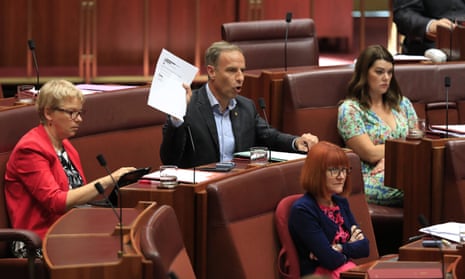The Senate has rejected a bid by Peter Dutton to subject 108 asylum seekers in Australia to a fast-track refugee application process that limits their rights of appeal.
On Tuesday evening the Senate voted 33 to 29 against extending the reach of the fast-track process, with Labor, the Greens, Centre Alliance and Tim Storer combining to pass a disallowance motion moved by Greens senator Nick McKim.
In 2014 the Abbott government established a fast-track refugee application assessment process for asylum seekers who arrived in Australia between August 2012 and January 2014.
Those asylum seekers have their applications judged by the immigration assessment authority, with more limited rights of appeal against findings of fact and adverse information than those whose cases can be reviewed in the migration and refugee division of the administrative appeals tribunal.
McKim told the Senate the home affairs minister’s legislative instrument would extend that process to people who arrived before 2012, denying them the ability to “fully explore” options to appeal against a departmental decision that they were not owed protection.
People in the fast-track “are not given a fair opportunity to put forward their case for asylum” and respond to adverse information, he said, leaving people “blindsided by issues and evidence” they did not know they needed to deal with to succeed in their refugee application.
“This is a significant denial of natural justice,” McKim said. “This creates different classes of people in Australia, some who have access to certain legal options and others who do not.
“It continues the demonisation of people seeking asylum to extract electoral and political advantage.”
Labor senator Kim Carr said the ALP would support the motion, noting that the instrument did “nothing” for Australia’s border security because it affected the rights of 108 individuals who were already in Australia.
Carr noted that Labor had already committed to abolish the fast-track process because it “does not provide fair, thorough and robust” assessment and review of refugee applications.
Carr accused the government of “failing to treat people in the Australian community with the respect they deserve” and being “completely out of touch”.
He said forcing more people into a process that limited the ability to have their application reviewed undermined their “fundamental human rights”.
The leader of the Nationals in the Senate, Nigel Scullion, said the government’s aim was to “facilitate status resolution activities” by ensuring that people to whom Australia did not owe an obligation of protection could be removed “in a timely manner”.
Refugee advocates and legal aid groups have argued the fast-track process is fundamentally unfair.
In one case taken to the high court, a man seeking asylum due to religious persecution was refused protection after a priest said he did not attend church as often as he claimed. According to Legal Aid Victoria, the fast-track process did not allow him to answer the immigration department’s concerns.
In April the high court upheld the legality of the fast-track process in that case, finding the immigration assessment authority had not acted unreasonably by not giving new information to the applicant.
An explanatory statement accompanying the instrument maintained it did not breach Australia’s obligations to asylum seekers because all fast-track applicants “have their protection claims fully assessed to determine whether they meet the protection visa criteria”.
It said the government considered it “reasonable and appropriate” that fast-track applicants had “a more limited form of merits review” against adverse decisions.
